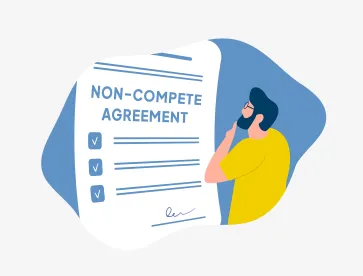The New York State legislature has passed a bill banning all non-compete agreements for all workers, regardless of their salary level or job function. The bill now goes to Governor Kathy Hochul.
New Labor Law Section 191-d, entitled “Non-compete agreements,” contains definitions and prohibitions, creates a private cause of action, and has an effective date 30 days after it becomes law. The new law will be applicable to contracts entered into or modified on or after the effective date. Accordingly, the law does not appear to be retroactive or void current non-compete agreements.
Definitions
For purposes of Section 191-d, the following terms are defined:
- “Non-compete agreement” means any agreement, or clause contained in any agreement, between an employer and a covered individual that prohibits or restricts such covered individual from obtaining employment, after the conclusion of the employment.
- “Covered individual” means any other person who, whether or not employed under a contract of employment, performs work or services for another person on such terms and conditions that they are, in relation to that other person, in a position of economic dependence on, and under an obligation to perform duties for, that other person. This definition focuses on the work performed or services provided, irrespective of a traditional employment relationship or independent contractor relationship.
Prohibitions
A total ban on non-compete agreements, Section 191-d(2) prohibits an employer or its agent, or the officer or agent of any corporation, partnership, limited liability company, or other entity, from seeking, requiring, demanding or accepting a non-compete agreement from any covered individual.
Section 191-d(3), further states, “Every contract by which anyone is restrained from engaging in a lawful profession, trade, or business of any kind is to that extent void.” This familiar language is identical to California’s ban on restrictive covenants (California Business & Professions Code §16600). Given the ban in subsection 2, this provision seems superfluous.
Section 191-d(3) further states that for all covered individuals, no employer or its agent, or the officer or agent of any corporation, partnership, limited liability company, or other entity “shall seek, require, demand or accept a noncompete agreement from any covered individual.” This sentence too seems redundant of subsection 2.
Private Right of Action
Section 191-d(4) creates a private cause of action for any covered individual to bring a civil action in a court of competent jurisdiction against any employer or persons alleged to have violated this section.
A covered individual has a period of two years from the later of: (i) when the prohibited non-compete agreement was signed; (ii) when the covered individual learns of the prohibited non-compete agreement; (iii) when the employment or contractual relationship is terminated; or (iv) when the employer takes any step to enforce the non-compete agreement.
The court may void any such non-compete agreement and order all appropriate relief, including enjoining the conduct of any person or employer; ordering payment of liquidated damages; and awarding lost compensation, and damages, including reasonable attorneys’ fees and costs. For the purposes of Section 191-d(4), “liquidated damages” are calculated as an amount not more than $10,000. Remarkably, Section 191-d(4)(b) says that the court “shall award liquidated damages to every covered individual affected under this section, in addition to any other remedies permitted by the section.”
Exceptions
Section 191-d(5) provides a carve-out for certain other restrictive covenants. Permitted agreements include:
- Agreements with a prospective or current covered individual that establishes a fixed term of service;
- Agreements prohibiting disclosure of trade secrets, of confidential and proprietary client information; and
- Agreements prohibiting solicitation of clients of the employer that the covered individual learned about during employment.
This carve-out section oddly contains the proviso, “provided that such agreement does not otherwise restrict competition in violation of this section.”
Previous Ban (Section 202-k)
Interestingly, Section 191-d(6) states that the new law will supplant former Labor Law Section 202-k, which already bans non-compete agreements for certain broadcast industry employees. Oddly, this subsection further states that if new Section 191-d is found to be invalid, Section 202-k will remain in effect unless similarly adjudged to be invalid.
Severability
The bill permits severability of new Section 191-d in the event any of its provisions, or portions thereof, are found to be invalid, leaving the rest of the law intact.
***
This certainly is a sea change in New York law. The bill’s language is confusing and redundant in parts. Litigation regarding the contours of the new law and what types of restrictions will be permissible is expected.





 />i
/>i

